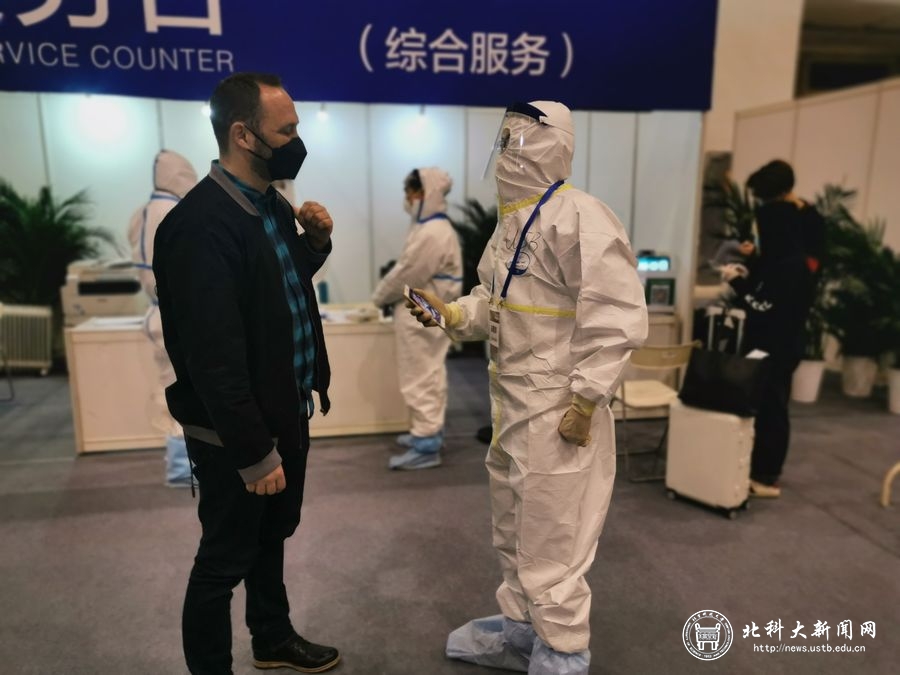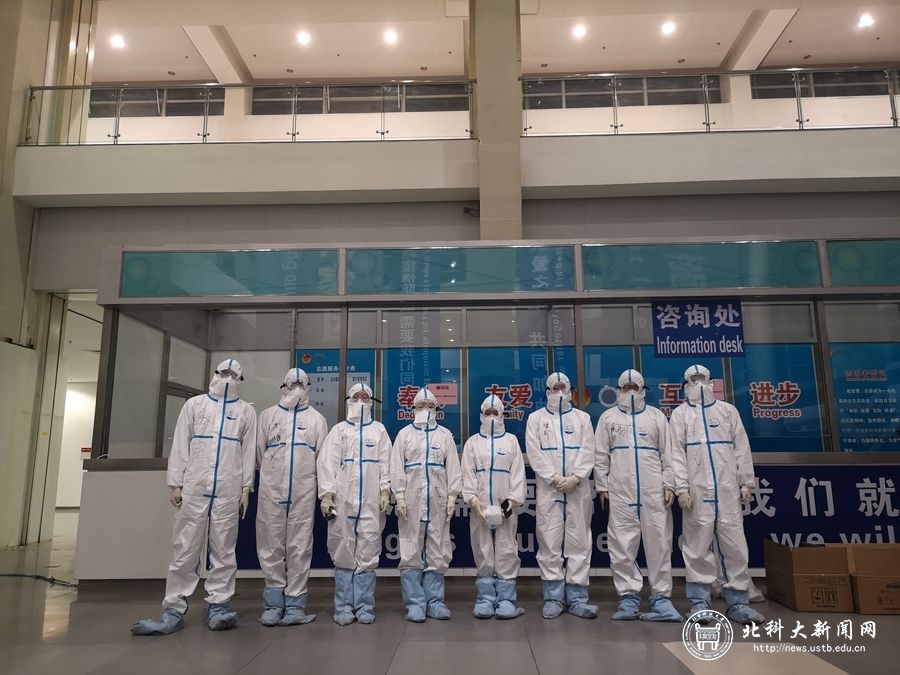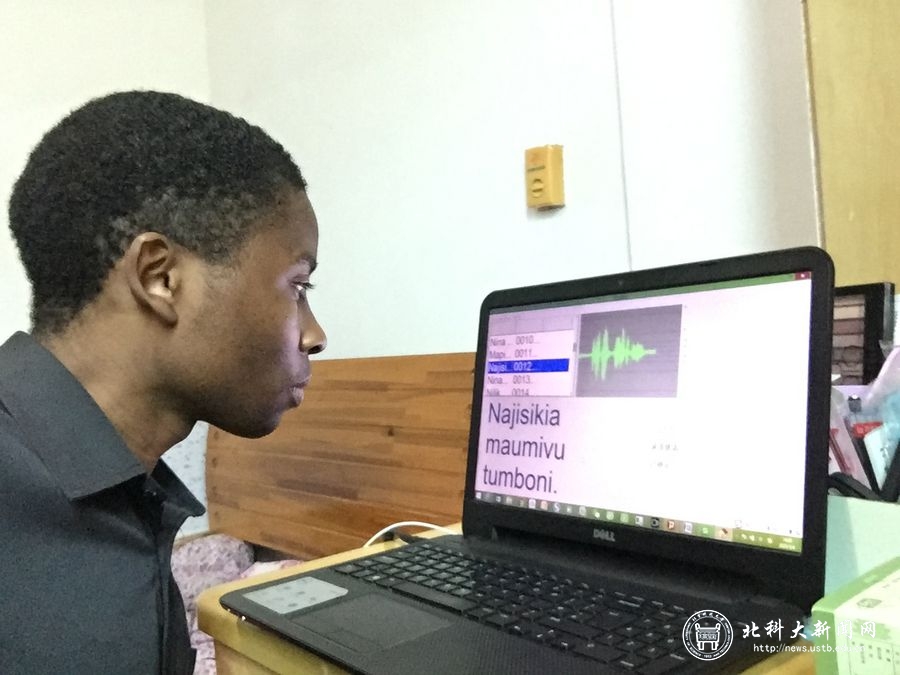
A volunteer translator from the University of Science and Technology Beijing talk with a foreigner at the New China International Exhibition Center in Beijing, March 24, 2020. (Photo provided to Xinhua)
"I volunteered to participate in the project. I think our translation will be useful for sharing the experiences in the prevention and control of COVID-19 with other countries," said Hao Jinghan, a volunteer translator.
BEIJING, March 25 (Xinhua) -- Wearing a mask, two layers of gloves, goggles and protective suit, Yu Linmin trudged around an exhibition-turned transit center for inbound passengers in Beijing and translated for a foreigner who was filling out forms.
Yu, 30, is a teacher from the University of Science and Technology Beijing. Now he has a new identity: a volunteer translator at the New China International Exhibition Center.
International flight passengers arriving in Beijing were screened for fever and coughing at the airport. Those who did not show symptoms were routed to the exhibition center, about 8 km away from the airport, for further checks before heading to various quarantine sites.
"No winter lasts forever, and spring is sure to follow," says a banner hanging on the wall where the smell of disinfectants lingers in the air.
"We usually maintain a distance of no less than 1 meter with passengers while helping them fill in forms including their name, nationality and address or explaining why they came here and what they are going to do," Yu said. "We also need to ease their anxieties."

Volunteers from the University of Science and Technology Beijing post for a group photo at the New China International Exhibition Center in Beijing, March 23, 2020. (Photo provided to Xinhua)
The translators try to share self-protection knowledge involving wearing masks correctly, frequent hand washing and disinfection with the passengers.
To facilitate communication with foreigners, the transit center provides multiple language services, including English and Japanese, to inbound passengers in need of help.
Together with 28 students from the university, Yu came to the center on Sunday. They will work for the next 14 days and sleep in nearby hotels. When they fulfill their tasks, they will undergo a 14-day quarantine at a designated venue. That means the translators cannot go home for nearly a whole month.
The members of the volunteer team take three shifts to provide translation services for inbound foreigners, with each shift lasting six or seven hours.
"We don't drink during our shifts because if we go to the bathroom we have to put on new protective suits," he said.
Yu became a volunteer because he was deeply moved by the dedication of medics across the country. "When I first came here, I was a bit worried about being infected. But once I got busy and saw that everyone at the center does their utmost to help others, I forgot the fears and hardships," he said.
International mega-cities such as Beijing and Shanghai are at the forefront of curbing imported COVID-19 cases.
Beijing reported two new confirmed COVID-19 cases from other countries on Wednesday noon, bringing the total number of imported cases in the nation's capital to 145.

An overseas student from Tanzania dubs a video about epidemic prevention and control into Swahili at Beijing Language and Culture University in Beijing, March 4, 2020. (Photo provided to Xinhua)
Translators have taken part in the fight against the virus since the early stages of the outbreak. To help foreigners in China and beyond better understand the virus, a team from the Beijing Language and Culture University launched an electronic guide in foreign languages on the prevention and control of COVID-19.
As of Tuesday, 23 language versions of the guide in various forms such as text, audio and video have been made available online, and more versions are being prepared.
Foreigners can check the information related to protective measures, diagnosis and treatment and entry tips of COVID-19 on the official WeChat account of the Beijing Advanced Innovation Center for Language Resources of the university or by scanning a QR code.
"I volunteered to participate in the project. I think our translation will be useful for sharing the experiences in the prevention and control of COVID-19 with other countries," said Hao Jinghan, a student of the university.
Hao encountered many difficulties in dealing with the translation, such as handling the complicated medical terms.
"Time is tight and tasks tough. To better express the part that I'm in charge of, I usually browse a large amount of information and seek advice from native speakers," she said.
"Many foreigners are experiencing what we have experienced. They may not know what China has done in the past two months. Through our translation, we can give them a glimpse of China's efforts and share our experience in the fight against the virus," said Han Lintao, a teacher from the university who also participated in the translation project.
原文链接:新华社英文客户端
相关链接:新华网、中国网、人民网、中国日报、亚太日报客户端、北京市政府官网
(责编:孟婍、陈丽萍)
 最新阅读
最新阅读 2025-11-21
2025-11-21 2025-11-17
2025-11-17 2025-10-31
2025-10-31 2025-10-17
2025-10-17 2025-10-11
2025-10-11 2025-09-29
2025-09-29 2025-09-25
2025-09-25 2025-09-23
2025-09-23 2025-09-18
2025-09-18 2025-09-12
2025-09-12